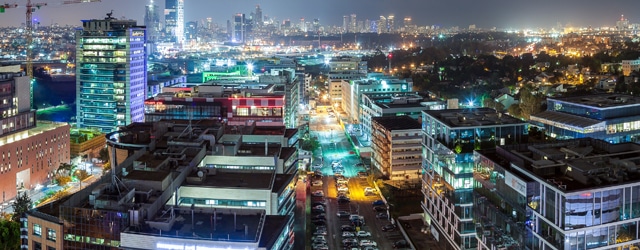Israel continues to forge ahead with technology development and high-end manufacturing as it looks to ride out the global slowdown.

The Israeli economy depends heavily on foreign trade and global exports. But this dependency presents a major challenge under current conditions, which include political instability in the US and Europe, economic uncertainty around the world owing to the slowdown in emerging markets, and a backlash against globalization. Last year Israel’s total exports of goods and services shrank 7% (in dollar terms) year-over-year, to $92 billion.
Yet the economy continues to show signs of growth and innovation. Israel’s GDP grew 3.2% in the first half of 2016. Inflation expectations remain low—and below Bank of Israel’s inflation target. The labor market is strong, with 4.8% unemployment rate at the end of the second quarter.
Thus, Israeli policymakers are keeping a sharp eye on developments abroad, especially in the US, where the election, now resolved in Donald Trump’s favor, was a cause of great consternation around the world. “Both US political parties are committed to the unique US-Israel strategic and economic relations,” says Dan Catarivas, director of foreign trade and international relations at the Manufacturers’ Association of Israel. “Yet US political instability and economic populism may affect the world economy and, indirectly, negatively impact the Israeli economy.”
Israel’s second major trade partner, the EU, is likewise a source of anxiety ever since the summer’s shocking Brexit vote. “It is too early to judge the impact of Brexit on the Israeli economy,” Catarivas notes. “Business continuity is a key interest of the Israeli economy and its industry for now. Mid to long term, Israeli companies may reconsider the status of the UK as a hub for business in Europe.”
Hopes In High-Tech
The high-tech industry remains one of Israel’s main economic drivers. It raised $2.8 billion in the first half of 2016, according to IVC Research Center, the industry’s leading research institution. One of the fastest-growing segments in venture investing in Israel is agriculture technology, or AgTech, as regulatory reforms in advanced economies open new opportunities for Israeli agriculture innovators. Total investments in agriculture and water technologies in 2015 reached $128 million, according to IVC.

The Israeli government continues to encourage and provide incentives for “advanced manufacturing” to supplement Israeli innovation and the traditionally strong high-tech sector. “We are not competing with low-cost manufacturing in developing countries…but high-end manufacturing: low-volume, high-mix, high-complexity manufacturing,” says Eyal Eliezer, director of marketing & strategy in the Foreign Investment & Industrial Cooperation division of Israel’s Ministry of Economy and Industry. Existing advanced manufacturing facilities include, among others, leading multinationals such as Intel, Pratt & Whitney, Johnson & Johnson, Applied Materials and HP. Proximity to research and development (R&D) centers, a strategic location close to the European market, and benefits from the 16-year-old EU-Israel Association Agreement all make the Israeli case stronger.
American investors and companies still play a prominent role; US investors led the Israeli market in 2014 with $14.6 billion in foreign direct investment, according to Israel’s Central Bureau of Statistics, which was 15.7% of the total FDI of $93.3 billion.
The Ministry of Economy and Industry reports that more than 270 multinational corporations—60% of them US-based—are active in Israel, where there are more than 300 R&D centers. Most important, this year Israel and the United States concluded the new security assistance Memorandum of Understanding, with a total value of $48 billion ($3.8 billion per year), for the years 2019–2028. It will succeed the current $30 billion agreement, signed in 2007, which will expire at the end of 2018.
Yet sources of investment in Israel are becoming gradually more diversified. The IVC Research Center expects “the vast majority” of Israeli venture capital funds, one of Israel’s tech growth factors, to have at least one Chinese investor in their financial round in 2016.
New Opportunities In Energy, Real Estate
One of Israel’s most significant investment opportunities—and challenges—in recent years is the residential real estate market. Real estate prices in this market have been rising steadily since 2007 as a result of the Central Bank’s interest rate policy, high demand from foreign investors—especially from Jewish communities in Europe and North America—and weak supply (reflecting red tape and the slow implementation of structural reforms). The Israeli government has introduced several regulatory tools to address this market because it discourages social mobility and retards economic equality and growth. New existing or proposed measures, such as higher taxes on second and third homes, already send negative signals to foreign investors and slow the market. September 2016 saw a decline of 2% in monthly residential sales, according to the Ministry of Finance’s latest report. Foreign investors’ acquisitions declined 14% that month, to 17% of all sales—the lowest since higher taxation measures were introduced in 2015.

Israel has also been transformed by recent discoveries of significant off-shore gas fields: Leviathan, with 470-620 billion cubic meters, and Tamar, with 246-280 billion cubic meters. These resources could fully serve the needs of the Israeli market for the next generation and open new export opportunities to regional allies, as well as addressing Israel’s fiscal deficit through taxes and royalties payments, but continuous disagreements between the energy companies and the Israeli government—two companies had near-monopoly control of the newly discovered resources, which the government sought to mitigate—kept the market in limbo. Last year, after much negotiation and amendments, the Israeli government passed a Natural Gas Framework for regulating the sector.
“During the last few months, since the gas framework was approved by Israel’s Supreme Court, new winds are blowing in the Israeli natural gas market,” says Amir Foster, head of strategy and research at Israel’s Association of Oil & Gas Exploration Industries.
“The Leviathan partnership allocates $120 million for front-end engineering and design of the Leviathan project,” says Foster. He ticks off key hurdles surmounted: “The development program for Leviathan has been approved by the government, sales contracts have been signed to sell natural gas to the local market, and the Ministry of Energy has announced several dramatic steps to reduce coal power stations’ use in favor of electricity production via natural gas.”
Israel will soon start a bidding process for 24 new licenses, and recently signed an historic agreement to export gas to Jordan. An Israel-Turkey reconciliation agreement has been signed, and there is a possibility of exporting gas to the Turks as well. “The Israeli gas market is moving forward, and in the upcoming two years we are likely to see advanced development,” Foster says. “All this, combined with the new drilling licenses bid round and the growing worldwide interest in the Middle East hydrocarbon scene, provides an interesting investment environment.”



